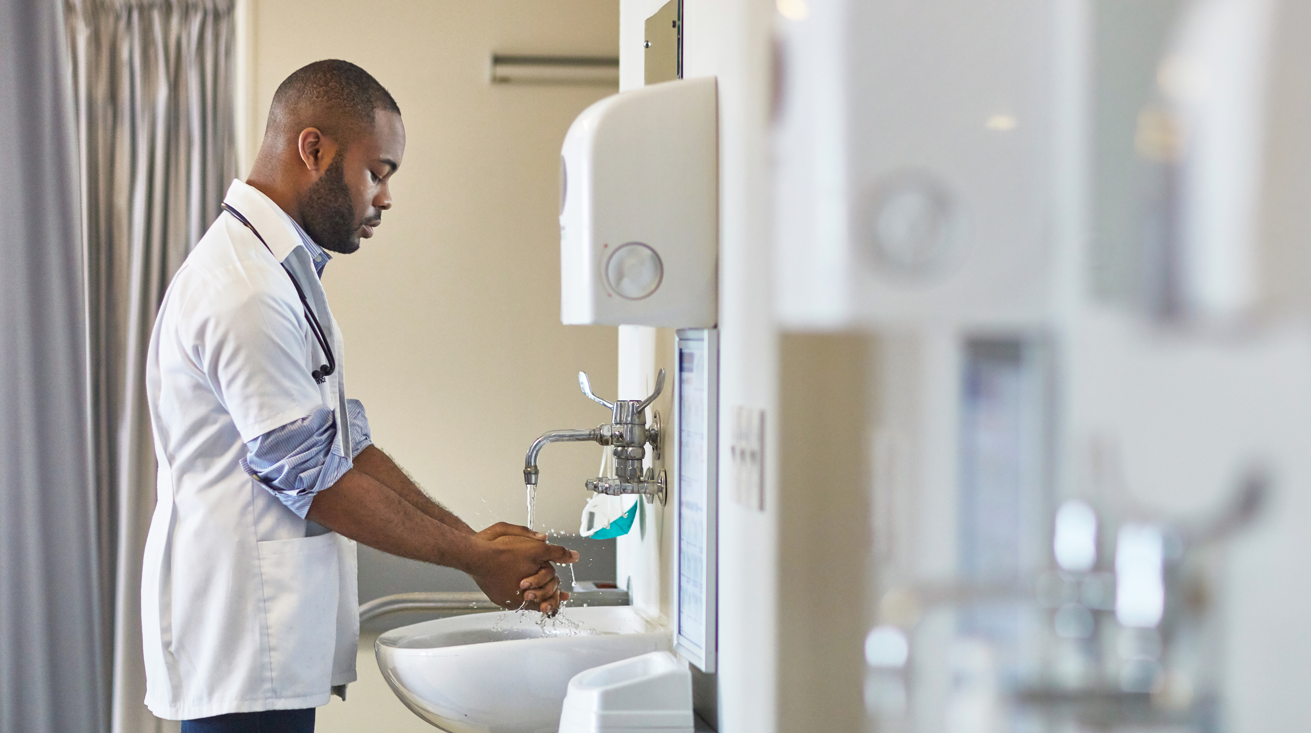The Best Way to Protect Patients: Wash Your Hands

Here’s some advice for medical professionals that’s always worth repeating:
The most effective way to protect patients’ health is to wash your hands.
Johns Hopkins Medicine says proper hand hygiene is the No. 1 way to prevent the spread of germs and illness. The Centers for Disease Control and Prevention (CDC) says handwashing protects patients and healthcare personnel.
Medical professionals should heed this advice and also make sure everyone in their healthcare facility — staff, patients, family, visitors, etc. — repeatedly washes their hands with soap and water or an alcohol-based hand sanitizer (ABHS). Keep these facts in mind:
- Patients who are sick, elderly, frail and/or recovering from surgery face increased risk of infection
- Hands spread germs, so providers should wash before and after caring for each patient
- ABHS is the most effective way to kill germs and does not create antimicrobial-resistant germs
- Gloves are not a substitute for proper hand hygiene
Sunshine Health has the latest guidance to help providers and their staff utilize one of the easiest, cheapest and most effective healthcare safety measures:
Why Washing Matters
Clean hands helps prevent the spread of respiratory and diarrheal infections. In healthcare facilities, germs can spread from people to people, and from surface to people, whenever someone:
- Touches their eyes, nose and mouth with unwashed hands
- Prepares or consumes food and drink with unwashed hands
- Touch surfaces or objects with germs on them
- Blows their nose/coughs or sneezes into their hands — then touches another person, surface or object
When to Wash
The CDC recommends that medical professionals should wash their hands:
- Immediately before touching patients
- Before performing aseptic tasks such as placing an indwelling device or handling invasive medical devices
- Before moving from working on a soiled body site to a clean body site on the same patient
- After touching patients or their surroundings
- After contact with blood, body fluids or contaminated surfaces
- Immediately after taking off their gloves
When To Wash With Alcohol-Based Hand Sanitizer (ABHS)
Unless your hands are visibly soiled, ABHS is preferred over soap and water in most clinical situations because it is:
- More effective at killing germs on hands than soap
- Easier to use when providing care, especially when moving from soiled to clean activities on the same patient; or when caring for multiple patients in shared rooms
- Causes less irritation and dryness than soap and water
- Improves hand hygiene adherence
When to Wash With Soap and Water
- When hands are visibly soiled
- Before eating or drinking
- After using the restroom
- While caring for patients with a suspected or confirmed infection during outbreaks of C. difficile and norovirus
Does Handwashing Make a Difference?
The CDC says studies show that hand hygiene:
- Reduces the number of people who get sick with diarrhea by about 23-40%
- Reduces the number of missed school days due to gastrointestinal illness by 29-57%
- Reduces diarrheal illnesses in people with weakened immune systems by about 58%
- Reduces respiratory illnesses, including colds, in the general population by about 16-21%
Resources
- Florida Department of Health: Handwashing
- Johns Hopkins Medicine: Hand Hygiene
- CDC Clinical Safety: Hand Hygiene for Healthcare Workers
- CDC About Handwashing (For Everyone)
- CDC Global Handwashing Day: October 15
Questions?
If you have any questions, please call Sunshine Health Provider Services at 1-844-477-8313 or visit the Secure Provider Portal. Our Provider Engagement staff are also here to help answer questions. Use the Find Your Account Manager tool to confirm the individual supporting your specialty and region. We encourage you stay up to date on Sunshine Health provider notices by reviewing and bookmarking Provider News.
